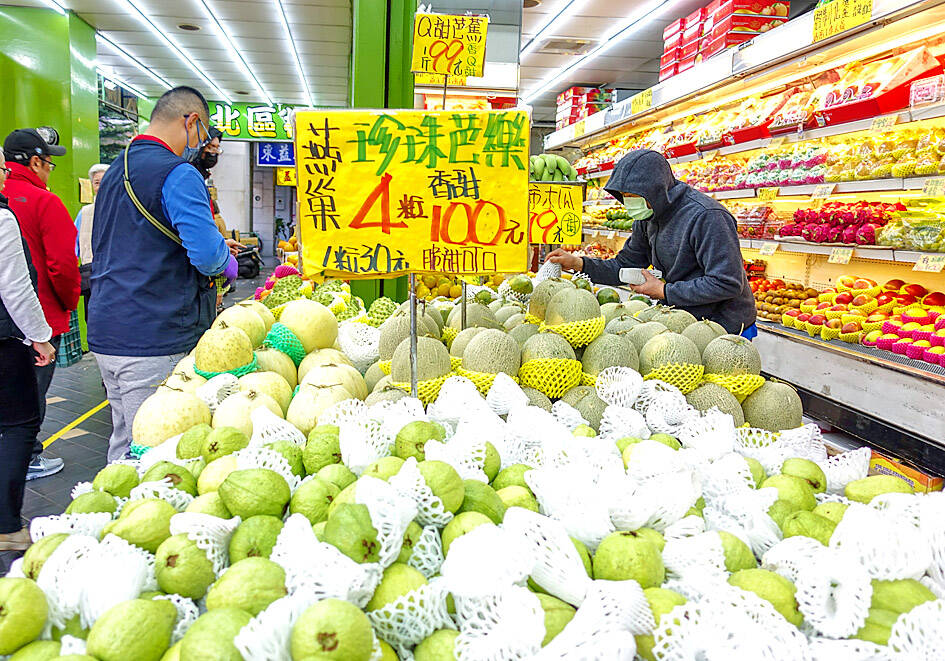The nation’s consumer price index (CPI) last month grew 2.1 percent year-on-year, faster than the central bank’s 2 percent target for the second straight month, as food prices remained elevated on tight supply linked to heavy rainfall, the Directorate-General of Budget, Accounting and Statistics (DGBAS) said yesterday.
The inflationary gauge finished last year with a 2.18 percent hike, exactly the same as the statistics agency projected in November last year, but is likely to begin falling, it said.
“Food prices climbed to a 40-month high of 4.05 percent, while dining costs and rents displayed no signs of deceleration, at 3.03 percent and 2.61 percent respectively,” explaining why inflation turned out worse than expected, DGBAS official Tsao Chih-hung (曹志弘) said, after speculating last month that the CPI would drop below 2 percent.

Photo: CNA
Vegetable prices spiked 30.9 percent year-on-year, as the negative impact of typhoons and rainstorms lingered, Tsao said, adding that fruits, cooking oil and fishery products also picked up noticeably.
Food costs alone pushed up the CPI reading by 1.1 percentage points, he said, calling the uptrend transient, as wholesale food prices had already demonstrated corrections earlier this month.
People might feel the pinch more acutely because prices for frequently purchased items gained 3.12 percent, he added.
Core CPI, a more reliable long-term price tracker as it excludes volatile items, expanded a benign 1.65 percent, Tsao said, adding that the latest CPI data shed 0.02 percent from one month earlier and ticked up only 0.15 percent after seasonal adjustments.
Furthermore, medicine and health, miscellaneous items and shelter costs remained stubborn inflation drivers with increases of 2.44 percent, 2.55 percent and 2.38 percent respectively, he said.
The producer price index (PPI), a measure of the price movements of goods from a seller’s perspective, advanced 2.92 percent, gaining significantly from a revised 1.07 percent in November last year, the DGBAS said.
For the whole of last year, the CPI expanded 2.18 percent, above the central bank’s 2 percent target for the third consecutive year, Tsao said, pinning the blame on service and shelter charges, in addition to food price hikes.
The PPI registered a mild annual rise of 1.35 percent, moderated by international raw material price corrections, he said.
It is noteworthy that the CPI for households comprised of members aged 65 or older hit 2.37 percent last year, higher than the average of 2.18 percent, because they spent more on food as well as medicine and healthcare, the DGBAS said.
The phenomenon is bound to deepen as Taiwan enters a super-aged society this year when people aged 65 and older constitute 20 percent of the population.

Intel Corp chief executive officer Lip-Bu Tan (陳立武) is expected to meet with Taiwanese suppliers next month in conjunction with the opening of the Computex Taipei trade show, supply chain sources said on Monday. The visit, the first for Tan to Taiwan since assuming his new post last month, would be aimed at enhancing Intel’s ties with suppliers in Taiwan as he attempts to help turn around the struggling US chipmaker, the sources said. Tan is to hold a banquet to celebrate Intel’s 40-year presence in Taiwan before Computex opens on May 20 and invite dozens of Taiwanese suppliers to exchange views

Application-specific integrated circuit designer Faraday Technology Corp (智原) yesterday said that although revenue this quarter would decline 30 percent from last quarter, it retained its full-year forecast of revenue growth of 100 percent. The company attributed the quarterly drop to a slowdown in customers’ production of chips using Faraday’s advanced packaging technology. The company is still confident about its revenue growth this year, given its strong “design-win” — or the projects it won to help customers design their chips, Faraday president Steve Wang (王國雍) told an online earnings conference. “The design-win this year is better than we expected. We believe we will win

Chizuko Kimura has become the first female sushi chef in the world to win a Michelin star, fulfilling a promise she made to her dying husband to continue his legacy. The 54-year-old Japanese chef regained the Michelin star her late husband, Shunei Kimura, won three years ago for their Sushi Shunei restaurant in Paris. For Shunei Kimura, the star was a dream come true. However, the joy was short-lived. He died from cancer just three months later in June 2022. He was 65. The following year, the restaurant in the heart of Montmartre lost its star rating. Chizuko Kimura insisted that the new star is still down

While China’s leaders use their economic and political might to fight US President Donald Trump’s trade war “to the end,” its army of social media soldiers are embarking on a more humorous campaign online. Trump’s tariff blitz has seen Washington and Beijing impose eye-watering duties on imports from the other, fanning a standoff between the economic superpowers that has sparked global recession fears and sent markets into a tailspin. Trump says his policy is a response to years of being “ripped off” by other countries and aims to bring manufacturing to the US, forcing companies to employ US workers. However, China’s online warriors